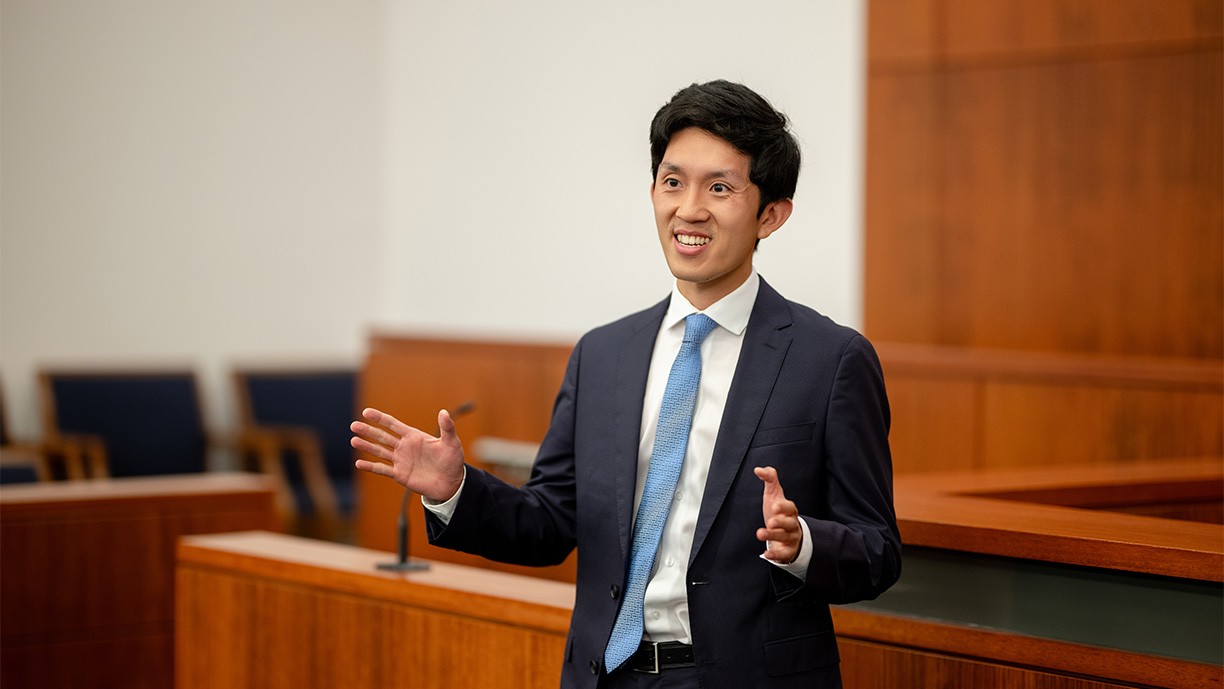Faculty Scholars: Preston Jordan Lim

Preston Lim started his academic career at Villanova Law last fall, drawn in large part by the opportunity to help build out the international curriculum. Before joining the faculty, he held two clerkships in Canadian courts, and he also traveled widely in China before earning his law degree. He is interested in both China’s relationship to international law and Canada’s legal system and constitutional history.
“One thread that runs through all of my work is a deep respect for legal diversity and comparativism,” Lim says. “For example, one question always in the back of my mind is how could this be done differently? Is there a lesson Canada can use from the U.S., or is there something the U.S. can learn from Canada and other legal systems?”
Lim’s interest in China stems from time spent there while pursuing a master’s in global affairs as a Schwarzman Scholar at Tsinghua University in Beijing. He continued to pursue this interest at Yale Law School and its Paul Tsai China Center, where he served as student director. He has researched and published on the human rights crisis in Xinjiang, where members of ethnic minorities have been placed in re-education camps and coerced into labor in factories. Lim has proposed international law solutions that the U.S. and other countries could use in response. He published a paper on this topic in the Asian-Pacific Law & Policy Journal in 2020, and he is now building on this work for a law review article.
“The question is, what can international labor organizations do, and what can individual countries acting on their own do, to make sure that goods that involve the use of forced labor aren’t ending up on the shelf?” he explains.
Lim believes that current legal education must include some focus on China as part of its core curriculum. “China is the second biggest economy in the world, it has global stature, and it is engaged on the international scene. China touches so many aspects of American life,” he says. “For example, even if you are at a big firm, the chance of you touching a file connected to China or the Asia Pacific is higher than it was just a few decades ago. Having some exposure to that system will better equip our students to lead.”
In addition to his China focus, Lim brings in-depth, hands-on experience with Canada’s legal system and constitutional history. He was raised in Vancouver, B.C., and during law school he worked as a policy advisor to Erin O’Toole, the former foreign affairs critic in the Parliament of Canada, and as a summer student in general litigation for a Toronto law firm. After earning his J.D., Lim completed two clerkships in Canada, which he says gave him “very broad exposure to a wide swath of legal matters, some criminal and some constitutional.” He was a judicial law clerk at the Court of Appeal for Ontario and later clerked for the chief justice of the Supreme Court of Canada in Ottawa.
Lim researches and writes about the history of Canadian constitutional law. For a current project, he is studying Canadian constitutional interpretation in the 1930s, with a focus on originalist thinking during the Great Depression. Last year, he published an article on Justice Antonin Scalia’s impact on Canadian jurisprudence. And he has written on a range of legal topics for the Toronto Star and The Globe and Mail, among other news outlets.
In addition to advancing the law school’s China curriculum, Lim sees opportunities to foster more exchanges between Canadian and U.S. constitutional theorists. “We have a wonderful constitutional faculty here, and a lot of the same concepts are present in the two constitutions, but they have evolved in different ways,” he says. “I hope we can create more of that dialogue involving experts in the two countries.”
Lim says that Villanova Law is the ideal place to pursue his interests in both China and Canada—and he’s grateful that an academic career gives him that flexibility. “There’s a dynamic faculty here; it’s an exciting place to be and very collaborative,” he says. “I knew my scholarship would get better by talking not only to people in the law school but also to specialists scattered throughout the university who are of great interest to me.”
